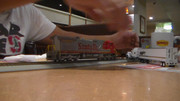I have no idea what the UK market will bear. Nice thing about those old BB's is that they were excellent performers (fly wheeled, rugged
motor) in a moderately detailed unit and moderately priced. Whenever I've thinned my herd, I post it to eBay and started the bidding
at 99 cents for an auction and always end it on a Saturday when buyers are most consistently near a desk top computer. The price will
find itself. Selling to the US market might possibly be worth the postage for the factory new pieces. Those turbine units might fetch some decent coin, particularly with sound.
Another option is to sell them at a model train show, so often occuring in the UK (as opposed to my somewhat remote locale). Bear in mind that shoppers in those venues are looking for bargains.
I have made large financial contributions to the UK Postal Service in my unending fascination with the British Range.
BTW, a good friend is a veteran driver for the Union Pacific. The UP is/was always on a quest to do more with less, thus their interest in huge units to pull huge trains thousands of miles. Not unlike Australia. In the last five years, in particular, the UP has spent a huge amount of capital on lengthening sidings to accommodate longer trains. Also, they have invested in an onboard computer system called a "Trip Optimizer" (the drivers call them "Trip Sodomizers) that regulate speed in accordance with terrain and weight, to maximize fuel efficiency. Lastly, the UP has settled on a six axle unit (E60?) of about 6,000 HP, (mass or menos) each and running them in multiple units, and quick to shut one or more down enroute to save fuel. According to two drivers I know, this has the net effect of beating the motors half to death resulting in many more breakdowns and severe reductions in speed using the surviving units to do the work of the dead units to move these insanely long trains which suffer increasing rates of coupler failure. In other words, the oft heard lament is that operations are managed by bean counters and do not take into account the exigencies of actual labor, of either man or machine.

(My friend illustrating how he collided, at speed, with a lorry intent on beating the train at crossing)




